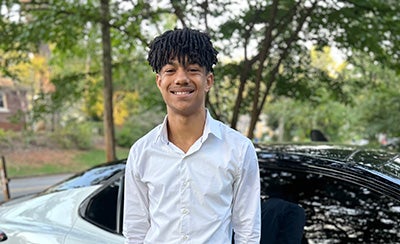Posterior urethral valves (PUV)
Florence, Alabama teenager Ayden Dillon has been fighting kidney disease since before he was born. Results of a routine prenatal ultrasound revealed a blockage where his urethra met the bladder. Immediately following his birth in 2009, Ayden was transferred to Children’s of Alabama, where kidney specialists diagnosed the newborn with posterior urethral valves (PUV) and severe hydronephrosis in both kidneys.
Posterior urethral valves (PUVs) are abnormal flaps of tissue that develop before birth in the urethra, the tube that carries urine from the bladder to outside of the body, blocking the flow of urine and causing an obstruction. PUV is a rare condition that affects only boys. As with Ayden, it is typically diagnosed during pregnancy or shortly after birth through ultrasound imaging.
Ayden had a complete blockage which was treated with three surgeries – one at 3 weeks, one at 5 weeks, and another when he was 3 years old. Those procedures, along with a good diet, regular exercise and other lifestyle choices, kept the disease at bay for many years.
“He was a pretty healthy kid despite the kidney disease,” his mom Lacey Willingham said, “but as he got older, his kidneys were not growing at the same pace as the rest of his body. They couldn’t keep up.”
When Ayden tried out for his school’s basketball team in 7th grade, bloodwork results from his pre-participation physical exam showed a decline in the health of his kidneys. Still, doctors cleared him to play, and the disease did not greatly impact Ayden’s daily life over the next two years.
“He played basketball again in 9th grade,” Lacey said. “His bloodwork wasn’t great, but it wasn’t critical at that time.”
Then, in July 2024, Ayden’s routine bloodwork showed that his kidney function had decreased to only 13%.
“We went to Children’s immediately,” Lacey said. “Ayden began taking medication, which he had never needed before, and we were traveling from Florence to Birmingham monthly for bloodwork.”
By October 2024, Ayden was feeling strong effects of the disease. After a thorough evaluation by the Children’s nephrology team, he immediately began hemodialysis as an outpatient at Children’s. The treatment required a 4-1/2 hour round trip from Florence to Birmingham three times a week. The disruption was tough on the family.
“I found it hard to balance caring for my one-year-old with the demands of traveling that often,” Lacey said. “For Ayden, the mental health and emotional impact was difficult. His social life came to a halt because of those three days. On the days we traveled, he didn’t have time to do the things he wanted to do once we got home. On off-treatment days, he was exhausted and had no energy to participate in after-school activities.”
Six weeks later, however, Ayden was able to transition to nightly home peritoneal dialysis. The Children’s Renal Care Center offers home dialysis training for families to eliminate their need to visit the hospital for dialysis. The training involves in-home visits from members of the renal care team to evaluate the feasibility of this option for the patient and to teach parents how to perform home dialysis. Then, they surgically implant a catheter needed for home therapy. Home dialysis is especially helpful for families that live far away from Birmingham. For Ayden’s family, it meant they would no longer need to make those trips three times a week. The ability to receive that crucial care at home has benefitted Ayden in many ways.
“He’s able to work out, practice with his team, he doesn’t miss as much school, and we have somewhat of a regular daily routine,” Lacey said. “It’s as close to a normal life as he can have at this point, and he’s not taking it for granted. He’s much happier.”
Ayden was evaluated for a kidney transplant by the Children’s transplant team and placed on the active donation list in February 2025. Once he receives a donor kidney, he will undergo a double nephrectomy to remove his sick kidneys and replace them with a healthy new kidney. In the meantime, he works hard to maintain good grades, is learning to drive with his new learner’s permit, plans to start college courses during summer vacation and is considering leading a small group in his church.
“He’s pretty amazing,” Lacey said. “I want to be like him when I grow up!”






